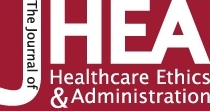Back Issue: Vol.4 No.1 (Spring/Summer 2018)
ISSN 2474-2309
Editorial
- Aloysius S. Ochasi, D.BE.
Address correspondence to: Aloysius S. Ochasi, D.Be., The Institute of Clinical Bioethics, Saint Joseph’s University, 5600 City Ave, Philadelphia, PA 19131, U.S.A. Email: aochasi@sju.edu
Pages: 1-3
Review article
- Donna K. Hammaker, JD, MGA, Thomas M. Knadig, EDD, MDIV, MA, and Blake J. Tobias, Jr.
Address correspondence to: Donna K. Hammaker, J.D., MGA, The National Institute on Health Care Management & the Law, Philadelphia, PA 19103, U.S.A. Email: hammaker@nih-cml.com
Pages: 4-8
Commentary
- Borut Strazisar, Ph.D. (in Law) and Branka Strazisar, Ph.D. (in Medicine)
Address correspondence to: Borut Strazisar, Ph.D., B&B Higher Education Institution, Cesta Staneta Zagarja 27a, SI – 4000 Kranj, Slovenia. Email: borut.strazisar@guest.arnes.si
Pages: 9-15
There has been the suspicion that doctors in Europe, due to the prevalence of medical paternalism in European culture, have interpreted the idea of “patient’s right to die with dignity” in reference to their inability to treat or giving up on treating the dying patients. Meanwhile, some European countries took a pragmatic position and legalized euthanasia and assisted suicide tailored to their social context, which is the move that acknowledges patients’ right than the doctors’ inability to provide cure for their patients. This paper visits briefly the historical developments of patient’s right and dying with dignity in Europe and explores some conceptual options how European doctors can understand such right in a clinical context.
RESEARCH ETHICS
- Marvin J. H. Lee, Ph.D., Kruthika Reddy, D.O., Junad Chowdhury, M.D., Nishant Kumar, D.O., Peter A. Clark, Ph.D., Papa Ndao, M.S., Stacy J. Suh and Sarah Song
Address correspondence to: Marvin J. H. Lee, Ph.D., The Institute of Clinical Bioethics, Saint Joseph’s University, 5600 City Ave, Philadelphia, PA 19131, U.S.A. Email: marvin.lee@sju.edu
Pages: 16-40
Recent studies show that racism still exists in the American medical profession, the fact of which legitimizes the historically long-legacy of mistrust towards medical profession and health authorities among African Americans. Thus, it was suspected that the participation of black patients in end-of-life care has always been significantly low stemmed primarily from their mistrust of the medical profession. On the other hand, much research finds that there are other reasons than the mistrust which makes African Americans feel reluctant to the end-of-life care, such as cultural-religious difference and genuine misunderstanding of the services. If so, two crucial questions are raised. One is how pervasive or significant the mistrust is, compared to the other factors, when they opt out of the end-of-life care. The other is if there is a remedy or solution to the seemingly broken relationship. While no studies available answer these questions, we have conducted an experiment to explore them. The research was performed at two Philadelphia hospitals of Mercy Health System, and the result shows that Black patients’ mistrust is not too great to overcome and that education can remove the epistemic obstacles as well as overcome the mistrust.
SPIRITUALITY AND ETHICS
- Angela F. Taylor
Address correspondence to: Angela F. Taylor, Parish Ministries & Services, Holy Cross Catholic Church, 140 E Mt Airy Ave, Philadelphia, PA 19119, U.S.A. Email: acantor13@gmail.com
Pages: 41-42
Book Review
- Richard J. Steffy, MS, MT (ASCP)
Address correspondence to: Richard J. Steffy, MS, MT (ASCP), Medical Lab Services, Christiana Care Health System, 4745 Ogletown-Stanton Road, Newark, DE 19713, U.S.A. Email: rsteffy@christianacare.org
Pages: 43-44
Student paper
- Sarah Klucznik and Holly Slepian
Address correspondence to: Sarah Klucznik and Holly Slepian, Villanova University, 800 Lancaster Ave, Villanova, PA 19085, U.S.A. Email: skluczni@villanova.edu hslepian@villanova.edu
Pages: 45-48
